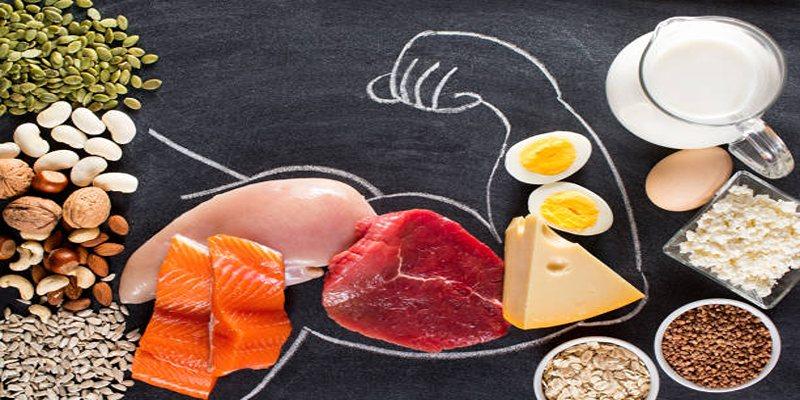Building muscle isn't just about lifting weights and hitting the gym; it's a holistic approach that involves nourishing your body with the right nutrients. Proper nutrition plays a crucial role in facilitating muscle growth, repair, and recovery. By consuming a balanced diet that includes adequate protein, carbohydrates, and healthy fats, you provide your body with the building blocks it needs to optimize muscle synthesis and fuel your workouts.
Whether you're a seasoned lifter or just embarking on your fitness journey, understanding the key principles of eating to gain muscle can make a significant difference in your results. It's important to prioritize nutrient-dense foods such as lean meats, fish, whole grains, fruits, and vegetables, while also staying adequately hydrated to support optimal muscle function.
The 7 Top Rules of Eating to Gain Muscle
1. Prioritize Protein Intake:
Protein, the essential building block of muscle tissue, plays a vital role in promoting optimal muscle growth and repair. To achieve these goals, it is crucial to ensure that each meal contains an adequate amount of protein. You can incorporate a variety of high-quality protein sources, including lean meats, poultry, fish, eggs, dairy products, legumes, and plant-based options like tofu and tempeh, into your diet. These protein-rich foods not only provide the necessary amino acids but also offer additional nutrients that support muscle health.
Moreover, consuming protein-rich foods post-workout can further facilitate the repair of muscle fibers and promote efficient recovery. This is because protein contains essential amino acids that are involved in the process of muscle protein synthesis, helping to rebuild and strengthen muscles after exercise.
2. Eat Frequently:
To maintain a positive nitrogen balance and optimize muscle growth potential, it is crucial to consume regular meals and snacks throughout the day. Aim for 4-6 well-balanced meals or snacks, evenly spaced, to ensure a consistent supply of essential nutrients that fuel muscle growth and prevent muscle breakdown.
By eating regularly, you provide your body with a sustained source of amino acids, the building blocks of muscle tissue. This steady stream of nutrients supports protein synthesis and helps establish an anabolic environment in your body, promoting muscle growth and recovery. Spacing your meals evenly throughout the day helps regulate blood sugar levels and prevents energy crashes. It also keeps your metabolism active and efficient, allowing your body to effectively utilize the nutrients you consume.
3. Consume Complex Carbohydrates:
Carbohydrates are the primary source of energy for your body, especially during intense workouts. Opting for complex carbohydrates, such as whole grains, fruits, vegetables, and legumes, can provide you with sustained energy throughout your workout. These foods not only fuel your body but also help replenish glycogen stores, which are crucial for muscle recovery and growth. By including a variety of these nutrient-rich carbohydrates in your diet, you can ensure that your body has the necessary fuel to perform at its best and support your fitness goals. So, next time you plan your meals, remember to prioritize these valuable sources of energy to optimize your performance and overall well-being!
4. Don't Forget Healthy Fats:
While protein and carbohydrates often take the spotlight, healthy fats play an equally important role in muscle building. Incorporating sources of unsaturated fats such as avocados, nuts, seeds, and olive oil into your diet is essential. Healthy fats support hormone production, joint health, and overall cellular function, all of which are vital for muscle growth.
5. Hydrate Adequately:
Proper hydration is often overlooked, yet it is absolutely crucial for maintaining optimal muscle function and promoting efficient recovery. Water, as an essential component, plays a vital role in facilitating nutrient transport, supporting muscle contractions, and regulating body temperature. To ensure adequate hydration, it is recommended to aim for a daily intake of at least 8-10 glasses of water. However, it is important to note that during intense workouts or hot weather conditions, increasing water intake becomes even more crucial to prevent dehydration and enhance overall muscle performance. By prioritizing hydration, you can maximize your body's potential and achieve peak physical performance.
6. Time Your Nutrient Intake:

Strategic timing of meals and snacks plays a crucial role in optimizing muscle growth and recovery. To maximize your results, it is recommended to consume a well-balanced meal or snack that includes both protein and carbohydrates within 1-2 hours before and after your workout. By doing so, you ensure that your body is supplied with the necessary nutrients to fuel exercise performance, promote muscle repair, and facilitate muscle growth. This timing strategy effectively supports the physiological processes involved in muscle adaptation and helps you achieve your fitness goals more effectively.
7. Monitor Portion Sizes:
When it comes to muscle gain, it's not just about consuming nutrient-dense foods, but also about maintaining portion control. Finding the right balance is crucial to avoid unwanted fat gain from overeating, while also ensuring that you're not hindering muscle growth by under eating. Pay attention to portion sizes and be in tune with your body's hunger and fullness cues. Additionally, consider adjusting your food intake based on your activity level, goals, and individual metabolism. Remember, it's all about finding that sweet spot to effectively support and optimize your muscle-building journey!
Conclusion:
To achieve your muscle-building goals, it is crucial to go beyond simply lifting weights. You need to adopt a strategic approach to nutrition that complements your workouts. By following these seven top rules of eating to gain muscle, you can optimize your nutrient intake, provide the necessary support for muscle growth and recovery, and ultimately maximize your fitness results. These rules include paying attention to your macronutrient ratios, such as consuming an adequate amount of protein to promote muscle protein synthesis. It also involves timing your meals and snacks strategically to fuel your workouts and provide the necessary nutrients for post-exercise recovery.







